Turkey | 30.04.2007
Council of Europe Urges Turkish Army to Stay out of Elections
The Council of Europe joined the growing chorus of disapproval over the statements made by the Turkish army that effectively warned that it would defend Turkey's secular state if a new president threatened it.
Terry Davis, the secretary general of the Council of Europe, has urged the Turkish army to stay out of Turkey's presidential elections which have turned into a divisive stand-off over secularism and democracy.
Davis, who heads the European human rights organization, called for the army to show restraint and to not try and influence the elections through force.
"The army should stay in its barracks and out of politics," he said on Sunday, as nearly a million people took to the streets of Turkey in support of secularism.
He added that he was "horrified" by the statements made by the army on Friday which accused the AKP party, the offshoot of a now-banned Islamist movement, of failing to prevent rising anti-secular activity in the country and warned that it is determined to defend the country's secular system.
"The problem that recently came to the forefront of the presidential election process has focused on the issue of questioning secularism. The Turkish armed forces are observing this situation with concern," the army said. "The Turkish armed forces... will openly and clearly display their position and attitude when necessary. No one should doubt this."
Fears of military intervention
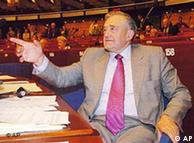 Bildunterschrift: Großansicht des Bildes mit der Bildunterschrift: Davis warned the military of meddling in politics
Bildunterschrift: Großansicht des Bildes mit der Bildunterschrift: Davis warned the military of meddling in politics
Davis expressed his concern at the possibility of the military intervening in the political process.
"I am very anxious about this statement from the Turkish military," he told reporters. "It sounds like an explicit attempt by the armed forces to influence the outcome of the presidential election."
The Council of Europe chief's comments echo those made by EU Enlargement Commissioner, Ollie Rehn over the weekend.
"It is important that the military leaves the remit of democracy to the democratically elected government," Rehn said. "This is a test case if the Turkish armed forces respect democratic secularism and the democratic arrangement of civil-military relations."
Any military involvement would severely damage Turkey's EU ambitions, with the country currently in negotiations to join the 27-nation bloc. Civilian control over the armed forces is one of the EU's fundamental accession criteria.
Should the army consider taking its threat further, it would command a high level of public support. The Turkish army regularly tops opinion polls as the country's most respected institution.
A potent armed and political force
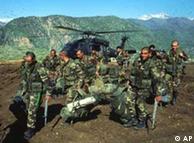 Bildunterschrift: Großansicht des Bildes mit der Bildunterschrift: The army is urged to stay in its barracks and out of politics
Bildunterschrift: Großansicht des Bildes mit der Bildunterschrift: The army is urged to stay in its barracks and out of politics
After toppling four governments in as many decades, most recently 10 years ago, the military also remains a potent political force that many outside Turkey -- particularly in the European Union -- fail to grasp.
It is also NATO's second biggest army after the United States, with half a million soldiers battle-hardened from two decades of fighting a Kurdish insurgency in southeast Turkey.
The Turkish army staged two old-fashioned coups d'etat in 1960 and 1980, but such is its influence that in 1971 and 1997 it managed to topple the government by "coups by communique."
In 1997, a list of "recommendations" came in the form of an ultimatum that was so strong that it toppled Turkey's first Islamist government, led by Necmettin Erbakan.
Its latest intervention, Friday's "midnight memorandum," reminded the government of Recep Tayyip Erdogan that the army had not only moral but also legal responsibilities to defend the "secular, democratic and social character" of the Turkish Republic.
But the government hit back and sharply called the military to order.
"It is inconceivable in a democratic state based on the rule of law for the general staff ... to speak out against the government," said Justice Minister Cemil Cicek, the government spokesman.
Turkish army unique in the West
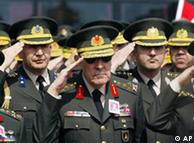 Bildunterschrift: Großansicht des Bildes mit der Bildunterschrift: The top brass used to control domestic and foreign policy
Bildunterschrift: Großansicht des Bildes mit der Bildunterschrift: The top brass used to control domestic and foreign policy
The army top brass has seen its influence wane over recent years under reforms readying the country for possible membership of the European Union. But until 2003, the Turkish army was unique in the West in maintaining a major political role.
Its top generals not only sat on but also ran the National Security Council that shaped the country's foreign and domestic policy.
That role was set out in Turkey's current 1982 constitution, dictated by the military junta that seized power in 1980 and overwhelmingly approved by plebiscite in 1983.
The constitution was amended in July 2003 as part of reforms to bring Turkey in line with EU norms and the all-powerful NSC of old became a civilian-dominated think tank.
Political Islam is anathema to Turkish officers, whose education in military schools, colleges and academies is dominated by Kemalist ideology, based on the principles set forth by Mustafa Kemal Ataturk, the founder of the modern, secular republic.
Large majority supports "sacred" army
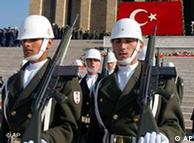 Bildunterschrift: Großansicht des Bildes mit der Bildunterschrift: The army is seen as the epitome of respectability
Bildunterschrift: Großansicht des Bildes mit der Bildunterschrift: The army is seen as the epitome of respectability
Although its tradition of meddling in politics is beginning to rankle in contemporary Turkey, for a large majority of ordinary Turks, the army is synonymous with respectability and serving in it -- as every Turkish male must after the age of 18 -- is a "sacred duty."
Opinion surveys unerringly have the military as champions of probity, compared to a political class perceived as stained with nepotism, corruption and cronyism.
The reality may be less squeaky clean but the army does its best to maintain its image and last year a court martial jailed a former commander-in-chief of the Navy for corruption.
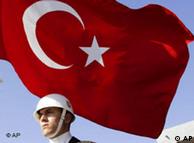
Comments